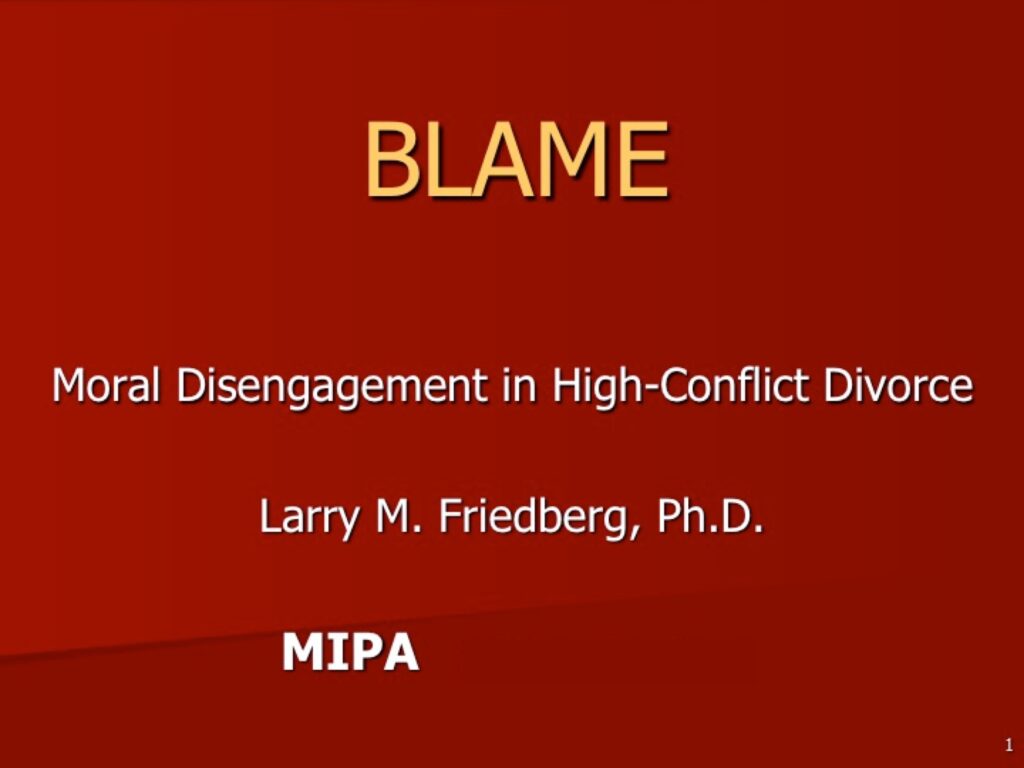
I have been thinking a lot about some basic questions which pertain to the work I do as a custody evaluator, mediator and parenting coordinator.
Most important and puzzling is the question: Why do disputing parties in high conflict divorce treat each other as enemies? And why do they use their children as soldiers in their wars?
Also, once we warn them that they’re hurting their children, why don’t they stop?
Why doesn’t training in communication skills, or education about the effects of divorce conflict on their children help these hard-core combatants?
I have concluded that the traditional concepts of forensic psychology, that is, ideas about mental disorders, too often miss the boat…
I recently received a letter from an 11 year old child whose parents had been sent to me for parenting coordination. He wrote in response to my recommendation that he take the bus to dad’s house for midweek parenting time rather than be picked up by dad an hour-and-a-half later:

“Dear Dr. Friedberg: I DO NOT WANT TO BE WITH MY DAD!! (2 exclamation points) I REPEAT I DO NOT WANT TO BE WITH MY DAD !!!!!! (6 exclamation points)…”
“I do not love him…” he wrote, “If I were a kid picking out a dad out 50 fathers he would be the first person to be rejected… Here are just some of the things I hate about him:
- He is mean
- He is fake
- He is dull
- He is boring
- He is SO CONTROLLING!!!!!
- He is annoying
- He is weird
- He is not a good father
- He is lazy
- He has no emotions
- He is so self-centered
- He does not care about me
- HE HAS AN UNCONTROLLABLE TEMPER!!!!!
- He is a CONTROL FREAK!!!
- I don’t think that he loves me truly
The boy’s mom told me that “Jim /not his real name/ used to control me, now he needs them. Jim uses them to control me… I didn’t tell him where I was moving, because my attorney and my therapist were afraid Jim would move next door.”

In a letter, this mom wrote to me: “Dr. C (her therapist) told me last month that Jim is so sadistic and sociopathic that in order for him to really change, it would take a lot of intense therapy…”
In a motion to the court, Mrs. J’s attorney stated “… it is the Defendant’s own erratic behavior and verbal abuse to the minor children which cause the children to be uncomfortable around the Defendant and has created tension in the relationship between the Defendant and the children…the Defendant is obsessed with his attempt to control, not only the Plaintiff, but the minor children…has a history of erratic and unstable behavior …etc.”
In a letter to me, introducing me to the case as the new Parenting Coordinator, this same attorney wrote:

Mr. J … abuses, he swears, he threatens and he controls his children and his ex-wife… Mr. J was (and still is) verbally, emotionally and mentally abusive to Mrs. J … It has been suggested by therapists that Mr. J be evaluated and treated for depression… It appears that Mr. J has one image of being a wholesome and loving church-going father and the reality of being a controlling, mean, obsessive and aggressive selfish angry man …”
I’m not saying that this guy is a wonderful man. If fact he is controlling and rigid in interacting with his children. He was not such a good husband, was dominating with his wife, and he had at least one affair. I believe, however, that his parenting deficits are treatable, and that he is not the person described by his ex-wife, his son, nor his ex’s attorney.
Robert LaCrosse and Janet Johnston, who presented at MIPA in the past, told us about forms of personality pathology which they find more often in parties stuck in high-conflict divorce.
Janet Johnston (1999) talked about varieties of what she called “narcissistic vulnerability.” In other words, people mired in high conflict divorce are exceptionally vulnerable to feelings of loss or rejection. They are vulnerable to threats to their self-esteem and identity as spouse, parent or person.
They also are more likely to use others to buttress their self-esteem, or to validate their view of themselves. And they may use others as receptacles onto whom they project negative and unacceptable parts of their self-image.
They’re more likely to experience their children as psychological extensions of themselves, wanting to control their minds as well as their behavior.
They are more likely to use primitive psychological defenses like splitting, projective identification, idealization and devaluation. Other psychologists have talked about “paranoid delusions,” about “folie a deux,” “paranoid projection” or about “symbiotic” parent-child relationships.
The antennas of a psychologist get raised when such words are used. Diagnostic labels like “narcissistic” and “borderline personality disorder” are evoked by such concepts.
I agree that such concepts apply to a subset of the people we see, and explain why some high conflict families seem unreachable.
I suspect these concepts are wrong or exaggerated as applied to most families enmeshed in divorce conflict.